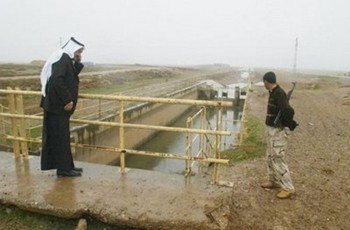 By Marwan Ibrahim Marwan Ibrahim
By Marwan Ibrahim Marwan Ibrahim
Sat Jan 29, 5:43 am ET KIRKUK, Iraq (AFP) – A worsening water shortage in Iraq is raising tensions in the multi-ethnic Kirkuk province, where Arab farmers accuse the Kurdistan region of ruining them by closing the valves to a dam in winter. “We are harmed by the Kurds, and the officials responsible for Baghdad and Kirkuk will not lift a finger,” said Sheikh Khaled al-Mafraji, a leader of the Arab Political Council that groups mainly Sunni tribal leaders. At the heart of the conflict is the Dukan dam, built in 1955 in Iraq’s northern autonomous region of Kurdistan, 75 kilometres (50 miles) northeast of Kirkuk province. “They release too much water from June to September while from October it is the opposite: there is not enough drinking water and even less to irrigate our lands,” Mafraji complained. Kirkuk province with its rich oil reserves has 250,000 hectares (617,740 acres) of arable land and 16 percent of its workforce engaged in agriculture, according to UN figures. Winter crops include wheat and corn, and summer harvests are mainly sesame, tomatoes and watermelon. A UN factsheet in October 2010 showed that while more rain fell in 2009 compared with 2008, the situation is still critical. Rainfall is now 50 percent below average. “The central government must intervene immediately to ask that our brothers in the north (Kurds) provide the necessary amounts of water for irrigation,” Mafraji said, threatening to hold demonstrations if his voice was not heard. … The growing water deficit and dams built by Iraq’s neighbours have significantly reduced the water flow in a country that was until the late 1950s a breadbasket of the Arab world. “The dam holds 1.3 million cubic metres of water,” said Shihab Hakim Nader, director of water resources in Kirkuk province. “There is a strategic reserve of 700,000 cubic metres (which must not be used), which means there remains 600,000 cubic metres that can be used. But the rain is becoming more scarce, and the level of the dam is decreasing.” “Also, the Kirkuk area receives only 30 cubic metres per second of water, when it should be receiving 75. This is only sufficient for drinking water,” he added. The issue is a ticking bomb in a province with strong ethnic loyalties, where Arabs accuse Kurds of intentionally harming the province. “The water issue is critical, and thousands of people driven to unemployment blame their situation on Kurdistan,” said Sheikh Burhan Mezher, the head of Kirkuk’s agriculture department. …
Iraq water shortages raising ethnic tensions
By Marwan Ibrahim Marwan Ibrahim